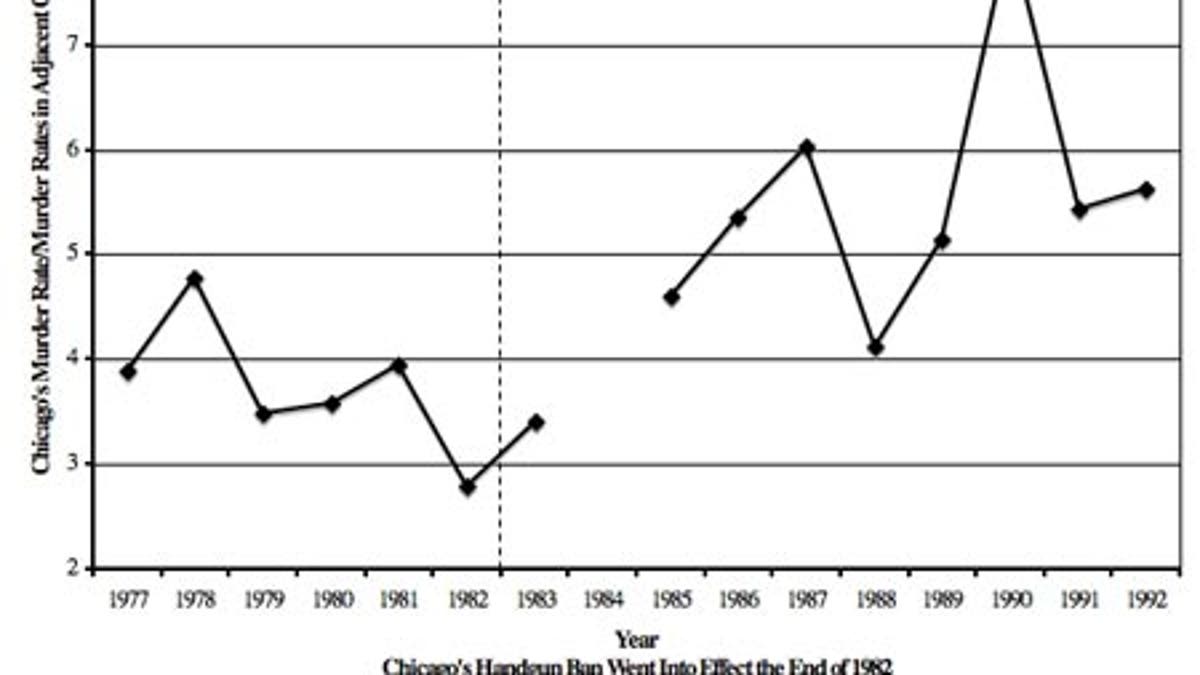
Courtesy: John R. Lott, Jr.
Does a ban on guns constitute a "reasonable regulation"? Mayor Richard Daley of Chicago sure thinks so. "We have the right for health and safety to pass reasonable laws dealing with the protection and health of the people of the city of Chicago," Daley said. Despite the push by Chicago to make McDonald v. City of Chicago about crime, a majority on the Supreme Court today appeared to want nothing to do that argument. Justice Anthony Kennedy described the right to self-defense as being as "fundamental" as the right to freedom of speech. The question the court faces is how many of Chicago’s regulations beyond the ban should survive.
Two years ago, the Supreme Court said a ban wasn't a "reasonable regulation" when it came to regulations that the federal government can impose-- that there is an individual right guaranteed by the Second Amendment to individuals allowing them to own handguns for self defense. They also ruled that people's guns cannot be required to be locked up and unloaded, since that would make it difficult for people to use them for self-defense.
The question that the Supreme Court addressed today in oral arguments is whether the same reasoning can be applied to state and city regulations. The Bill of Rights was originally passed to make clear that there were limits on what the federal government could do. It was only after the Civil War that Republicans in Congress passed the 14th Amendment to apply those same restrictions to states to protect citizens' freedom. Even more important, much of the Congressional debate focused on stopping Southern states from banning newly freed blacks from owning guns.
While much of the Bill of Rights has been "incorporated" to apply to the states through the 14th Amendment, so far the Supreme Court has not explicitly applied this to the Second Amendment. It's hard to believe the Court believes that part or all of the First, Fourth, Fifth, Sixth and Eighth Amendments apply to the states (the parts of the Bill of Rights that have so far reached the Supreme Court on this issue), but not the Second Amendment. It is this constitutional issue that is before the Supreme Court today, not whether gun control would be an expedient way to cut down on crime. Nevertheless, it is hard for anybody, including Supreme Court Justices, to ignore safety questions. Obviously, it is this latter issue that Mayor Daley and the City of Chicago hopes the court will focus on. And indeed, today James Feldman, an attorney defending the Chicago handgun ban, repeatedly tried to argue that Chicago’s law was needed to cut down on murder and suicide.
Gun control is often framed as a trade-off between freedom and safety, but as I discuss in my book, more guns don't cause more crime. Research shows that freedom and safety go together. If there are any doubts about this, we can simply look at the District of Columbia and its huge -- 25 percent! -- drop in its murder rate the year after the Supreme Court struck down its gun control laws. Much of that drop was undoubtedly due to the court striking down the gunlock requirement on rifle and shotguns, since Washington continued making it difficult for people to register handguns.
But Chicago does not need to look beyond its own immediate neighborhood for evidence. The figure at the top of this piece from the forthcoming third edition of my book "More Guns, Less Crime" shows how Chicago’s murder rates changed relative to the rates in the adjacent counties. In the five years before the ban, Chicago’s murder rate fell by 28 percent relative to those counties. (County level crime data only goes back to 1977.) In the five years after the ban, Chicago’s murder rate doubled relative to those other counties. The patterns are also similar when Chicago's or Washington's murder rates are compared to other large cities or the U.S. as a whole, where gun laws are much less strict.
We all want to take guns away from criminals. But all too often, gun control laws mainly serve to disarm law-abiding citizens instead. Police play an extremely important protecting people, indeed probably they are THE single most important factor, when it comes to individual safety. But, as the police know all too well, they almost always arrive at the crime scene after the crime has been committed. If the government can’t protect its citizens, a majority of the Supreme Court appears to believe that people should be allowed to defend themselves.
John R. Lott, Jr. is a FoxNews.com contributor. He is an economist and author of "More Guns, Less Crime" (University of Chicago Press). The book’s third edition will be published in May."
